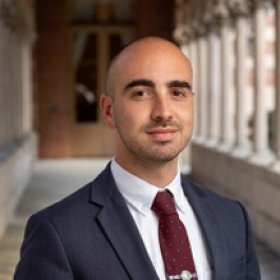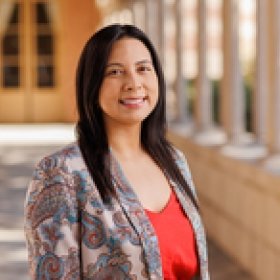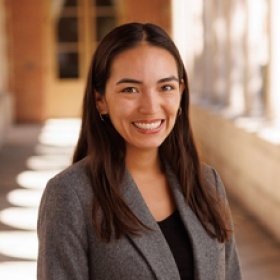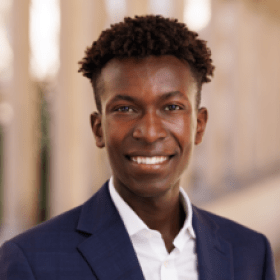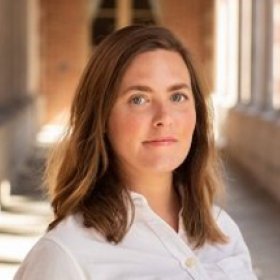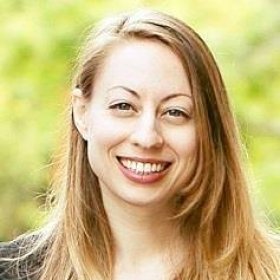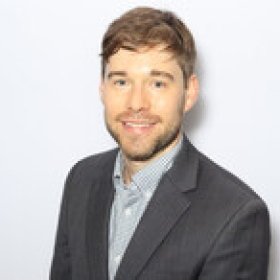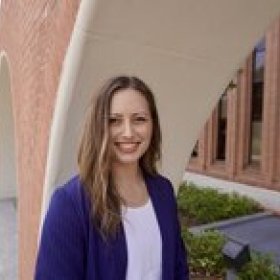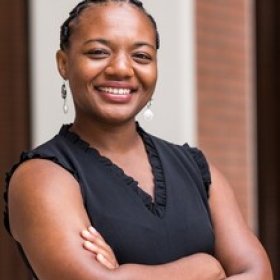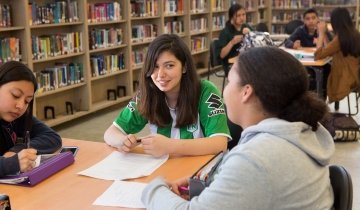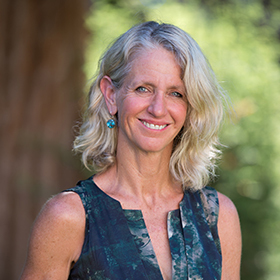
K-12 Education Policy Concentration (PhD)
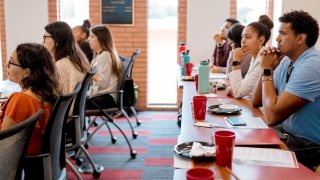
Concentration Overview
The K-12 concentration equips students to conduct rigorous qualitative, quantitative, and mixed-methods research to address challenges of policy and practice that affect the education of historically marginalized students. From their first days at Rossier, our students are paired with faculty advisors and contribute to collaborative research projects on pressing issues in education today, including
- COVID impacts and recovery,
- technology in schools
- school choice
- privatization
- school board politics
- supports for students experiencing housing insecurity
- school finance
- community engagement in reform
- culture war issues
- curriculum
- accountability policies
This apprenticeship model provides students with consistent mentoring throughout their graduate program and hands-on experience with all aspects of the research process: design, data collection and analysis, writing, presenting, and fundraising. Most K-12 students also directly contribute to the USC EdPolicy Hub, a Southern California research-practice partnership that involves in-depth partnerships with educational agencies in the region to answer their most fundamental questions.
The Hub and other research partners give students valuable opportunities to conduct applied research and participate in an intellectual education policy community via regular meetings, research presentations, and networking.
Students take courses in departments across the campus, including in the Price School of Public Policy, which partners with Rossier to offer a joint degree (Master’s in Public Policy and PhD in Education). Our concentration has a strong record of placing alumni in tenure-track positions, think-tanks and other independent research organizations, and school district research positions around the nation.
Explore Programs
Doctor of Philosophy in Education
The PhD program prepares aspiring research scholars to advance educational equity and excellence through rigorous, cross-disciplinary research, supported by assistantships, coursework, and an inclusive professional community.
Admission
Our admission criteria and requirements ensure that PhD applicants are evaluated holistically, rigorously and equitably. USC Rossier adheres to the university’s non-discrimination policy and is committed to providing equal opportunity for all applicants.
Faculty Bios

Dr. Patricia Burch is professor at the USC Rossier School of Education and a Co- Faculty Director of the USC EdPolicy Hub. Burch has several decades of experience studying large scale reforms aimed at improving equity in large urban school systems including after school programs, teacher quality, shared leadership and instructional improvement. Burch employs sociological and broader social and critical theories to examine the relationship between schooling and education markets and the implication of these dynamics for equity. Current projects focus on the political and institutional dynamics of education markets in artificial intelligence, the school to prison pipeline, after school programming, and pandemic recovery efforts. CV
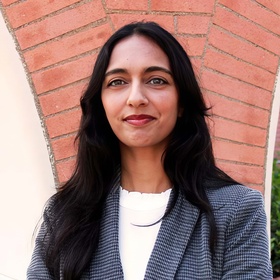
Huriya Jabbar is an associate professor of education policy at Rossier. Her research uses sociological and critical theories to examine topics such as how families and school leaders navigate school choice policies; the rise of conservative and far right movements in education; how improvement in schools and organizations can be impeded by staff turnover, which can reproduce structural inequalities in education; and how investments in public housing can transform educational and economic opportunities for historically marginalized communities. CV
Julie Marsh is a professor of education policy at USC Rossier and USC Sol Price School of Public Policy, and Faculty Director of Policy Analysis for California Education. Using qualitative and mixed-methods and blending perspectives in education, sociology, and political science, Marsh studies educational governance and efforts to decentralize and democratize decision-making, as well as accountability and instructional policy, with particular attention to the process and politics of policy adoption and implementation, the role of data, and the equity-implications for historically marginalized students. Current projects focus on school boards, the political leadership of superintendents, and the expansion of school choice and education savings accounts. CV
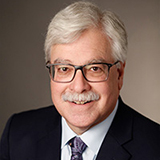
Lawrence Picus is the Richard T. Cooper and Mary Catherine Cooper Chair in Public School Administration at the USC Rossier School of Education. His current research interests focus on adequacy and equity in school finance as well as efficiency and productivity in the provision of educational programs for PreK-12 school children. Picus is a member of the Board of Trustees of the Accelerated Schools, a charter school located near USC. He is the co-developer of the Evidence-Based Model for estimating adequate levels of resources for public PK-12 schools. The model remains the most widely used tool for estimating how much money our schools need across the states.
Morgan Polikoff is a professor at USC Rossier and the co-Faculty Director of the USC EdPolicy Hub. Using predominantly quantitative methods, he studies curriculum, standards, assessment, and accountability policies; public opinion on education; and the impact of COVID on American families’ educational experiences. His current projects include a multi-year intervention study of a math curriculum implementation and a national longitudinal survey study of the factors influencing student absenteeism and engagement. CV
Sample Research Projects
Huriya Jabbar is leading a three-year project, funded by the Spencer Foundation, to study curriculum conflicts and culture wars (e.g., book bans, anti-LGBTQ+ policies) in public schools in regions across the U.S. Our team will situate these often localized actions within their broader ideological agendas, macro contexts, and mobilization networks using social network analysis and qualitative case studies of six school districts across California, Texas, and Ohio.
Huriya Jabbar is leading a five-year study, supported by the William T. Grant Foundation, American Institutes for Research, and Kresge Foundation, to examine innovative policies to connect school and housing sectors, including the federal Housing and Urban Development’s Choice Neighborhoods Initiative (CNI), which seeks to strengthen community social cohesion through cross-sector collaboration. Our team is examining whether CNI improves educational opportunities for low-income Black youth and their families by transforming their social networks.
Julie Marsh is leading a multi-year study of local governance in California, to examine how school board members are experiencing and negotiating the rapidly changing political, social, and cultural context and ways to better support them to fulfill the promise of a just, participatory democracy. This mixed methods study started with a multiple case study of 10 school board members that drew on critical ethnography and critical phenomenology. The second phase draws on an online survey administered to a near-census of the state’s board members and follow-up interviews. The research contributes to a statewide initiative - Getting Down to Facts III - that seeks to inform the incoming California governor and state superintendent of instruction elected in 2026.
Julie Marsh is leading research on the expansion of vouchers/Education Savings Accounts. The mixed-methods study - conducted in partnership with quantitative scholars at Tulane University and the national REACH Center - seeks to understand the effects of expanded choice. The qualitative portion of the study examines how education leaders across and within sectors in Arizona and Florida are responding to this new choice landscape; how, if at all, are they shifting their political and organizational practices; and, what are the implications for equity?
Lawrence Picus is currently advising Wyoming, Vermont, and Alaska on the design of their state school funding systems. His work focuses on estimating adequate levels of spending for schools, and helping state policy makers develop funding systems to support improved student learning.
Morgan Polikoff is leading a 2.5-year project, funded by the Bill and Melinda Gates Foundation, with the Riverside Unified School District (RUSD) and Great Minds, Inc. (the publisher of the widely-used Eureka Math curriculum). The project involves studying the transition of RUSD to the new Eureka Math2 curriculum, and testing the impact of technology-enhanced student- and teacher-facing features in the digital curriculum on teachers’ instruction and students’ motivation, engagement, and persistence.
Morgan Polikoff is working with researchers at the USC Center on Applied Research in Education to conduct a longitudinal study of American families’ education views and experiences using the Understanding America Study. Past research has investigated the impact of COVID, COVID recovery interventions, and views on potentially contentious race- and LGBT-related curriculum topics. Current work focuses on tracking student attendance and engagement and the factors that promote or inhibit these goals.
Recent Publications and Book Projects
Burch, P. (2022). Ed. System failure: Policy problems in the school to prison pipeline. New York: Routledge. Critical Social Thought Series
Engel, L. and Burch, P. (2021), Policy sociology in the contemporary global era: Continued importance and pressing methodological considerations. Education Researcher. First published April 26, 2021
Burch, P. (2021). Hidden markets: The new education privatization. New York: Routledge. Critical Social Thought Series. 2nd Edition
Jabbar, H., Tracy, H., Germain, E., Lenhoff, S., Alonso, J., & Haderlein, S. (in press). The double burden of school choice. AERA Open. Link
Jabbar, H. & Holme, J. J. (2025). Teacher turnover, social capital, and improvement: How instability disrupts schools. Educational Evaluation and Policy Analysis. Link [online first]
Jabbar, H., Daramola, E.J., Marsh, J., Enoch-Stevens, T., Alonso, J., & Allbright, T. (2022).
Social construction is racial construction: Examining the target populations in school-choice policies. American Journal of Education, 128(3), 487–518. Link
Marsh, J., Bridgeforth, J., Mulfinger, L., O’Neal, D., & Tong, T. (In Press) Shocking the system? The COVID crisis and virtual schooling in Oregon. Educational Evaluation and Policy Analysis https://doi.org/10.3102/01623737241255324
Daramola, E.J. , Marsh, J. & Allbright, T. Advancing or inhibiting equity: The role of racism in the implementation of a community engagement policy. (2023). Leadership and Policy in Schools, 22(3), 787-810. https://doi.org/10.1080/15700763.2022.2066546
Eisenlohr, A., Bulkley, K.E., Kennedy, K., & Marsh, J. (2024) A tale of two systems: Choice and equity in the District of Columbia’s charter schools. Educational Policy, 38(6), 1346-1385. https://doi.org/10.1177/08959048231198816
Marsh, J. & Jabbar, J. The rhetoric and reality of school choice: A critical policy analysis. Harvard Education Press (book project, in progress)
Odden, A.R. and Picus, L.O. (2020). School Finance: A Policy Perspective, 6th edition. New York, NY: McGraw Hill.
Polikoff, M. S., Fienberg, M., Silver, D., Garland, M., Saavedra, A., & Rapaport, A. (2025). Who wants to say “gay?” Public opinion about LGBT issues in the curriculum. International Journal of LGBTQ+ Youth Studies, 22(3), 339-360. Link
Saavedra, A., Polikoff, M., Silver, D., Rapaport, A., Garland, M., & Scollan-Rowley, J. (2024). Searching for common ground: Widespread support for public schools but substantial partisan divides about teaching contested topics. USC Center for Applied Research in Education and USC EdPolicy Hub.
Polikoff, M. (2021). Beyond standards: The fragmentation of education governance and the promise of curriculum reform. Harvard Education Press. Link
Haderlein, S. K., Saavedra, A. R., Polikoff, M. S., Silver, D., Rapaport, A., & Garland, M. (2021). Disparities in educational access in the time of COVID: Evidence from a nationally representative panel of American families. AERA Open, 7(1), 1-21. Link
Meet Our PhD Students
Our student body, one of the most diverse in the country, is comprised of accomplished research-scholars.

